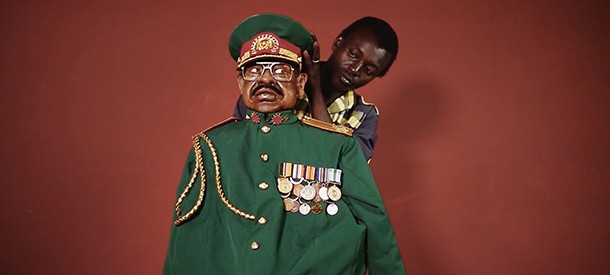Roopa Gogineni is a director and photographer, and has created documentaries for The New York Times, Al Jazeera, and VICE. Her experience producing reality TV in Somalia was chronicled in an episode of NPR’s “Invisibilia.” Gogineni’s work across media embraces the complexity of histories and conflicts in the Global South.
“I Am Bisha” will premiere at the 2018 Full Frame Documentary Film Festival on April 6.
W&H: Describe the film for us in your own words.
RG: The film is a dark comedy from the Nuba Mountains of Sudan, where government and rebel forces have been fighting for many years. It’s a mashup of scenes from Bisha TV — a satirical web series starring the puppet personas of President Omar al-Bashir, and his genocidal henchman, Hemeti — and those from the life of Ganja, the puppeteer who controls the President’s head.
W&H: What drew you to this story?
RG: It was so funny! I still laugh every time I watch Bisha TV, despite having memorized the lines. I was drawn to the irreverence of the cast and crew. I love finding humor in unexpected places and sharing it with an audience.
W&H: What do you want people to think about when they are leaving the theater?
RG: That resistance to authoritarian rule takes shape in many forms. That there are tactics we as Americans can learn from people around the world who live under — and resist — oppressive regimes.
W&H: What was the biggest challenge in making the film?
RG: The biggest challenge was getting to the Nuba Mountains. The territory is controlled by a rebel government, and is cut off from the rest of Sudan. I took three trips in total, and no journey was straightforward.
At one point I hitched a ride on a cargo plane with Ukrainian pilots transporting several tons of bar soap. Then I rode on a teetering rebel army truck before I was handed off to a Kenyan missionary on his way to dig boreholes.
In addition to the transportation problems, the area is an active war zone — at the time there were regular aerial bombardments.
W&H: How did you get your film funded? Share some insights into how you got the film made.
RG: For a while the film was self-funded, and then NYT Op-Docs and Firelight Media came in midway with much appreciated support.
W&H: What does it mean for you to have your film play at Full Frame?
RG: It’s an honor to have my film play alongside such beautiful, critical documentaries. It’s my first time at Full Frame, and I’m very excited!
W&H: What’s the best and worst advice you’ve received?
RG: The best advice I received was how to productively channel outrage. Being angry about injustice can be a source of creative energy or it can be debilitating.
I’ve been pretty lucky to receive wise counsel from friends and mentors, so I haven’t had much bad advice.
W&H: What advice do you have for other female directors?
RG: Walk into every room knowing you deserve to be there, that you have good ideas, and the skills to execute them.
W&H: Name your favorite woman-directed film and why.
RG: There are two films I have a hard time choosing between. The first is Sarah Polley’s “Stories We Tell,” because it shows the fallibility of memory.
The second is Jihan El-Tahri’s “Cuba, An African Odyssey.” El-Tahri is an archival wizard, and the film is about a moment of South-South relations we should all know more about.
W&H: Hollywood and the global film industry are in the midst of undergoing a major transformation. Many women — and some men — in the industry are speaking publicly about their experiences being assaulted and harassed. What are your thoughts on the #TimesUp movement and the push for equality in the film business?
RG: My background is in journalism, which is facing a similar reckoning. Working as a freelancer, there is no HR department or manager to alert when abuse occurs. We work for ourselves without the protective structure of unions. Given this reality, the movement needs to take place in public to confront the culture of the industry.







